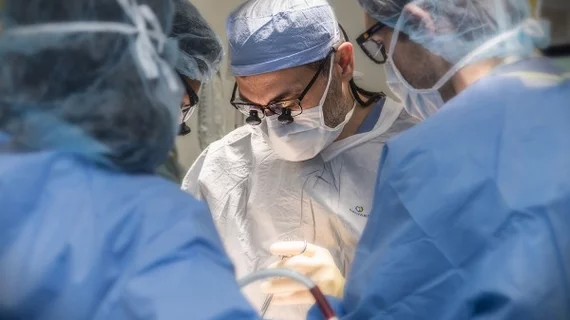Heart surgeons may deliver better outcomes during stressful procedures
Heart surgeons often achieve better outcomes when the first five minutes of a procedure are especially stressful, according to a new analysis published in JAMA Surgery.[1]
This study included heart rate data from 38 surgeons performing cardiac, thoracic, digestive, orthopedic gynecologic, urologic or endocrine surgery. All surgeries were performed at one of four university hospitals in France from November 2020 to December 2021.
The surgeons all wore sensors to track their data for five minute after the first incision. While 10.6% of the procedures were cardiac surgeries, another 3.3% were thoracic surgeries. A majority of procedures were elective, open and performed under general anesthesia. The median surgeon age was 46 years old, and 78.9% were men. The median patient age, meanwhile, was 62 years old, and 48% were men.
Researchers focused on major surgical complications—defined as major adverse events during surgery or within the 30-day postoperative period—as well as extended ICU stays due to organ failure and mortality. The surgeries performed for this study were associated with a major complication rate of 18.2%, extended ICU stay rate of 3.8% and mortality rate of 1.8%.
Increased stress levels during the first five minutes of surgery—as determined by tracking the surgeon’s low frequency to high frequency (LF:HF) ratio—were associated with a significant reduction in the risk of a major complication taking place. Stress did not, however, appear to impact the risk of an extended ICU stay or mortality.
What, exactly, do these findings tell us?
“Although excessive stress or cognitive workload may harm surgical performance, modest amounts of stress may stimulate better performance in individuals with requisite levels of experience and coping abilities,” wrote first author Jake Awtry, MD, a general surgery resident with Brigham and Women’s Hospital in Boston, and colleagues. “Of note, our study included exclusively attending surgeons performing predominantly elective surgical procedures. It is possible that our experienced surgeon population was well equipped to cope with increased stress and that we lacked a sufficient volume of high-complexity, high-stress cases exceeding their compensatory capacity to detect a harmful effect of stress. Within the confines of our study population, our results are consistent with suggestions that a limited increase in stress may optimize performance.”
Awtry et al. also noted that it remains unclear “whether the change in heart rate variability per se or its causative influences” are responsible for the boost in surgery outcomes. Either way, their findings do “suggest an association between human factor elements and patient outcomes while highlighting the complex association between physiological stress and surgeon performance.”
“The quantitative assessment of surgeon stress may thereby enable future efforts toward optimization pursuant to enhanced patient outcomes,” the group concluded.
Click here the full analysis in JAMA Surgery.

